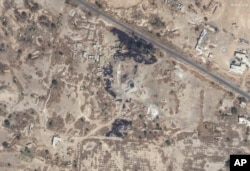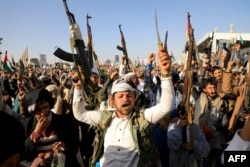U.S. and British officials are expressing optimism a day after the two countries unleashed what is now being described as two waves of strikes against Houthi positions in Yemen, retaliation for weeks of Houthi attacks that have disrupted shipping and damaged vessels transiting the Red Sea and Gulf of Aden.
A U.S. defense official told VOA Friday that the initial assessment indicates the first wave of precision strikes against 60 targets in 16 separate locations were successful in degrading the ability of the Houthis to launch further attacks.
The official, speaking on the condition of anonymity in order to discuss operational details, said a more comprehensive assessment of the strikes was still underway. But the sentiment echoed other early assessments by senior U.S. officials, who have described the damage to Houthi capabilities as “significant.”
“We feel very confident about where our munitions struck,” Lieutenant General Douglas Sims, the director of the Joint Staff, told reporters Friday. “But we don’t know at this point the complete battle damage assessment.”
U.S. Central Command late Thursday said that U.S. fighter jets, naval vessels and submarines hit more than 60 targets at 16 locations across Houthi-controlled parts of Yemen, including command and control nodes, munitions depots, launching systems and production facilities.
But Sims said Friday the U.S. and Britain launched a second wave of strikes against another 12 locations 30 minutes to an hour after the initial strikes were carried out.
The additional sites, each with multiple targets, “had been identified as possessing articles that could be potentially used against forces, maritime and air,” he said, noting the strikes were taken in self-defense.
U.S. officials said, in all, more than 150 precision guided munitions were aimed at Houthi targets, including Tomahawk Land Attack Missiles.
At least three U.S. guided missile cruisers and destroyers (the USS Gravely, the USS Philippine Sea and the USS Mason) took part in the strikes along with an Ohio-class submarine, fighter jets from the USS Dwight D. Eisenhower aircraft carrier, and U.S. Air Force jets.
A separate statement Friday from the British Defense Ministry said four of its Typhoon fighter jets, accompanied by an air refueling tanker, used laser-guided bombs to hit two locations: a drone launch site in Bani, in northwestern Yemen, and an airfield in Abbs, used to launch cruise missiles and drones at ship in the Red Sea.
“Early indications are that the Houthis’ ability to threaten merchant shipping has taken a blow,” the ministry said.
Despite the optimistic strike assessments, U.S. officials have said they believe the Houthis are likely to retaliate.
U.S. military officials confirmed that Houthi militants launched an anti-ship ballistic missile early Friday, though it did not hit any ships.
“My guess is that the Houthis are trying to figure things out on the ground and trying to determine what capabilities still exist for them,” said Sims. “Their rhetoric has been pretty strong and pretty high, and I would expect that they will attempt some sort of retaliation.”
“I would hope they wouldn’t,” he added, describing the Houthi efforts as “generally fruitless.”
But the White House repeated its warning Friday that the Houthis would face additional consequences if their attacks persist.
U.S. President Joe Biden “reserves the right, and he won’t hesitate to take further action to protect our troops and our facilities and international commerce,” said White House national security spokesperson John Kirby.
Still, Kirby emphasized the U.S. is hopeful additional strikes will not be necessary.
“We’re not interested in a war with Yemen. We’re not interested in a conflict of any kind here,” he told reporters. “Everything the president has been doing has been trying to prevent any escalation of conflict including the strikes last [Thursday] night.”
Also Friday, the U.S. unveiled new sanctions aimed at commodity shipments that have been funding the Houthis and their Iranian backers.
U.S. Treasury officials imposed sanctions on a Hong-Kong-based company and another company in the United Arab Emirates, both of which have been working with Sa’id al-Jamal, a financier who has been supporting both the Houthis and Iran’s Islamic Revolutionary Guard Corps — Quds Force.
“We will take all available measures to stop the destabilizing activities of the Houthis and their threats to global commerce,” Treasury Under Secretary Brian Nelson said in a statement.
Since mid-November, the Houthis have launched at least 28 attacks, affecting citizens, cargo and vessels from more than 50 countries, according to the U.S.
U.S. official have said Biden made the decision to launch Thursday’s strikes following a Houthi attack on shipping lanes in the Red Sea and Gulf of Aden this past Tuesday that involved 18 one-way attack drones, two cruise missiles and one ballistic missile.
U.S. combat jets, along with U.S. and British military vessels, responded by shooting down the drones and missiles, averting any damage to ships or injuries to their crews in the area.
Last week, the United States and 12 allies issued a statement warning the Houthis of unspecified consequences if their attacks on shipping in the Red Sea continued.
The statement followed the launch in mid-December of Operation Prosperity Guardian by the United States, Britain and nearly 20 other countries to protect ships from Houthi attacks.
Since the launch of Prosperity Guardian, at least 1,500 vessels have passed safely through the Bab el-Mandeb Strait, which connects the Red Sea with the Gulf of Aden.
The U.N. Security Council issued its own resolution Wednesday, calling on the Houthis to stop the attacks immediately.
VOA White House Bureau Chief Patsy Widakuswara contributed to this report.


